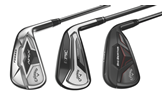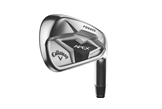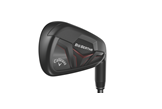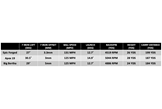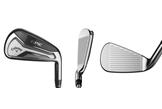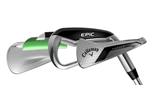TESTED: Callaway’s money-no-object Epic Forged iron
Published: Last updated:
Callaway Epic Forged iron
How this new money-no-object hollow-headed model compares against two of Callaway’s most popular mainstream offerings.
- RRP: £1999
- 7-iron loft: 27°
- 7-iron offset: 3.3mm
- Stock shaft: Aerotech Steel Fiber FC and Mitsubishi Tensei AV silver (both graphite)
There’s a growing trend in golf for brands to launch super-premium irons, with prices that run to thousands. The trend can be traced to PXG, who were the first to push the price boundary back in 2015. As other brands have watched PXG convince golfers to spend £2,000 or more on a set of irons, they’ve come up with their own.
Designing golf equipment without the constraints of cost means designers can use all sorts of exotic materials, construction methods and premium shaft and grip options, which you’ll never find on mainstream ranges.
The result can be a 7-10 per cent difference in forgiveness performance between a brand’s most and least expensive irons, and that’s what you pay for. The numbers aren’t up for debate – what is, though, is whether club golfers can notice the difference.
We put Epic Forged up against Callaway’s Apex 19 and Big Bertha irons to see how it compares and where it belongs in Callaway’s iron line-up.
ROBOT TESTED: Which golf ball suits my game?

Callaway Epic Forged iron what’s new
Epic Forged are aimed at very specific game improving golfers – the type of players who want more speed and distance and don’t mind paying for the privilege. Forged 1025 carbon heads, the same material as Callaway musclebacks, bring a solid dose of premium sound and feel to the party, which game improvers don’t often get with irons aimed at them.
Callaway’s Cup Face tech along with a new variable face thickness pattern improves on-centre hit speed and protects drop offs for typical misses. Suspended tungsten weighting inside the Epic’s head positions the centre of gravity precisely, aiding launch across what is a very strong lofted set.
So strong are the lofts they’re almost exactly the same as Callaway’s super strong lofted Rogue X – the longest iron we’ve tested in 2019. Epic Forged comes as standard with two graphite shaft options, which says a huge amount about the type of golfers they’re aimed at.

Callaway Epic Forged irons our verdict
Strong-lofted irons regularly take a beating, as some golfers feel cranking lofts to add distance is cheating. But in the right hands, we reckon they can be a revelation.
For two years now Callaway’s Rogue X irons have been the longest irons we’ve tested; they’ve also had the strongest lofts, and the X’s lofts are virtually the same as the Epic Forged. It means shots launch low, spin less and carry a country mile, as long as your swing has no struggles launching shots high from the turf.
For us, while Epic Forged are very long, they’re not for all distance-seeking golfers, as slower swing speeds often need help launching shots higher (not lower), to maximise carry. Our test pro didn’t feel the Epic felt like a forged iron, which probably comes down to the hollow cavity construction. He did, as our data supports, find shots powered off the face like a driving iron. Looks-wise Epic Forged has half the offset of the Rogue X iron, the top edge is thinner and much more nicely shaped, giving an almost “player” style look.
TESTED: Irons ranked by forgiveness

Don’t just focus on the Epic’s 12-yard carry distance gain over the beautiful Apex 19; you have to realise everything about Epic Forged is geared towards speed and distance. We’ve mentioned the strong lofts, but the shafts are also over a quarter of an inch longer than the Apex 19, which could cause accuracy/consistency issues, and there’s a heavier swingweight. It all means you swing at the same speed but the club travels faster, all to boost speed and distance.
As lovely as Epics are, they are for a relatively small group of very well-heeled golfers. Players who need forgiveness, speed and distance, but are also capable of launching the 7-iron (which is just 0.5° weaker than the Apex’s 6-iron) and the rest of the set high enough, without dropping silly levels of backspin.
TESTED: Which Callaway iron suits me?
How they compare in data

Watch: Callaway Epic Forged vs Apex 19 vs Big Bertha irons
Up against – Callaway Apex 19

• RRP: £1,299 (s) £1,399 (g)
• 7-iron loft: 30.5°
• 7-iron offset: 3mm
• Stock shaft: True Temper Elevate 95 (s) True Temper Catalyst (g)
The Apex 19 had big shoes to fill, as the previous Apex CF16 was an all-time classic. We’re convinced the 19 is an improvement, though, as it offers a lovely mix of forged forgiveness with cup face technology and is a brilliant looking iron.
If you find yourself torn between Apex and Epic, decide what’s really important to your game. If you plump for the extra distance Epic offers and regularly find yourself putting from the rear of the green back towards the flag, you probably made the wrong choice.
TESTED: Best Game Improver iron 2019
Up against – Callaway Big Bertha

• RRP: £1140 (s) £1399 (g)
• 7-iron loft: 29°
• 7-iron offset: 5mm
• Stock shaft: KBS Max 90 (s) UST Mamiya Recoil (g)
As it doesn’t have the strongest lofts in Callaway’s iron range, Big Bertha is really nicely set up to perform at moderate to average swing speeds. It is actually a really nice looking compact head, which you don’t get with all improver and super game improver irons.
If your game’s truly suited to Big Bertha the Epic Forged shouldn’t really be on your radar, as both sets require very different launch conditions to get the best out of them.

